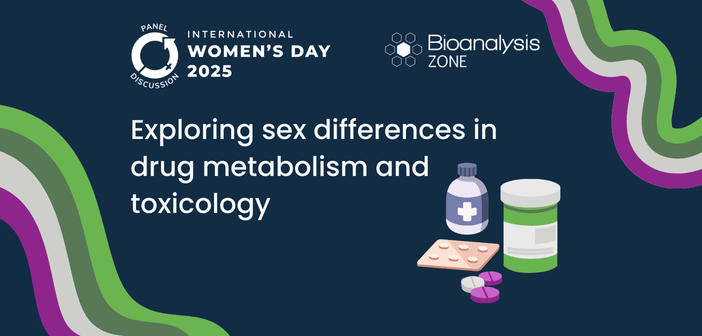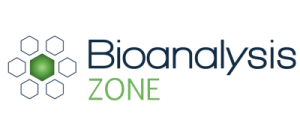Breaking the bias in women’s health: exploring sex differences in drug metabolism and toxicology

NOW AVAILABLE ON-DEMAND
Closing gaps in women’s health through awareness, innovation and inclusive bioanalytical research.
Significant knowledge gaps in women’s health continue to challenge our understanding of how drugs affect men and women differently. This year for International Women’s Day, Bioanalysis Zone is spotlighting the knowledge gaps that exist in women’s health and celebrating the research that the bioanalytical community is currently undertaking to close these gaps. This discussion will explore sex differences in drug toxicology and metabolism, challenges in identifying these sex-related differences, and future strategies to create a more inclusive approach to drug development and testing that benefits both men and women.
Who may this interest?
- Biomedical and Analytical Scientists assessing drug metabolism, toxicology, efficacy and safety in preclinical and clinical drug development.
- Researchers and students in pharmacology, biology and biomedical sciences focused on sex differences in health.
- Regulatory professionals involved in drug approval processes and creating guidelines for inclusive drug development.
- Biostatisticians and Data Scientists analyzing sex-based data in drug development.
- Physicians, Pharmacists and Clinicians interested in personalized medicine and women’s healthcare.
- Anyone interested in understanding sex-based differences in health outcomes!
Speakers

Tanja Zijp
PhD student
Department of Clinical Pharmacy and Pharmacology at the University Medical Center Groningen (Netherlands)
Tanja Zijp is currently undertaking a Doctor of Philosophy (PhD) and is a Trial Pharmacist at the Department of Clinical Pharmacy and Pharmacology of the University Medical Center Groningen. She earned her Bachelor of Pharmacy (2015), Honors Bachelor (2015) and Master of Pharmacy (2019) degrees at the University of Groningen. She performed her PhD research (defense in 2025) at the University of Groningen and the University Medical Center Groningen, which focused on optimizing treatment with the immunosuppressive drug tacrolimus in recipients of solid organ transplants. Her research includes studies on the drug-drug interaction of tacrolimus with antifungal drugs, bioanalytical method development and usability testing for smart monitoring devices to study adherence. Additionally, in the last year of her PhD, she focused on sex differences in tacrolimus metabolism and the influence of menopause on this process.
 Stephanie Huang
Stephanie Huang
Professor
Department of Experimental and Clinical Pharmacology at the University of Minnesota (MN, USA)
Dr R Stephanie Huang is a Distinguished McKnight University Professor at the Department of Experimental and Clinical Pharmacology, University of Minnesota. She is also an Associate Director for the Institute of Personalized Medicine at the University of Minnesota and a Co-Chair of the Genetic Mechanism Program within the Masonic Cancer Center at the University of Minnesota. She is a Chair of the International Pharmaceutical Federation (FIP; The Hague, Netherlands) Special Interest Group on Personalised and Precision Medicine and a Chair for the Oncology Special Interest Group within the Pharmacogenomics Global Research Network (PGRN; MT, USA). To date, she has published over 120 peer-reviewed research papers, many of which are in high-caliber journals, e.g., Nature, Nature Medicine, PNAS, Blood, Cancer Research, Genome Biology and American Journal of Human Genetics. Dr Huang is a board-certified Clinical Pharmacologist with translational research expertise in genomics, molecular and cell biology, and computational biology.
The primary objective of Dr Huang’s research program is to develop clinically useful models that enable prediction of the risks of non-responsiveness and toxicities to chemotherapeutic medications before they are prescribed to treat the patient. By leveraging pre-clinical, high-throughput drug screening and molecular data for model construction and applying the machine learning models to patient tumor molecular data, the likelihood of patient tumor responses to hundreds of drugs can be imputed in a matter of weeks. These omics-based drug sensitivity projections can then enable identification of biomarkers directly in patient cohorts without the requirement of drug exposure in patients. It can also be used to nominate novel drugs and/or repurpose medications for cancer therapy. More recently, the Huang lab developed new computational algorithms to rationalize select combination therapy and enable individual, cell-level drug sensitivity prediction.

Vibha Jawa
Executive Director for Biotherapeutics Bioanalysis in the Translational Medicine organization
Bristol Myers Squibb (NY, USA)
Dr Vibha Jawa is the Executive Director for Biotherapeutics Bioanalysis in the Translational Medicine organization at Bristol Myers Squibb. She leads the bioanalytical function supporting DMPK and immunogenicity for biotherapeutics and cell/gene therapies, providing strategic oversight for BMS’s development portfolio. With over 20 years of experience, Dr Jawa has contributed to 20+ IND, BLA and MAA filings, working in biologics, vaccine development and gene therapy. Before BMS, she led the Predictive and Clinical Immunogenicity group at Merck (NJ, USA) and supported biotherapeutic programs from discovery to development during her 14-year tenure at Amgen (CA, USA).
A recognized leader in bioanalysis and immunogenicity, Dr Jawa has 100+ peer-reviewed publications and serves as a reviewer and editor for The AAPS Journal and Journal of Pharmaceutical Sciences. She is a Fellow of the American Association of Pharmaceutical Scientists (AAPS) and actively contributes to scientific societies and consortia, including IQ, SC Space Consortium and EIP. As Chair of various AAPS scientific communities, Dr Jawa has championed diversity, mentoring younger scientists and amplifying underrepresented voices in science.
At BMS, Dr Jawa leads the STEM community for the New Jersey chapter within R&D and serves on the Global STEM Council. She collaborates with diverse business resource groups, including networks for women, Latin, Black, LGBTQ, Veteran and Asian employees. As Co-Lead of the BMS Early Development R&D mentoring program, she has supported numerous early-career scientists, particularly women, and expanded the program across R&D functions. Dr Jawa is also an active mentor for the BMS Women’s Network (B-NOW), focusing on career growth, leadership, presentation skills, conflict resolution and work-life balance. Through her leadership, scientific expertise and commitment to mentoring, Dr Jawa continues to make a significant impact in biopharmaceutical innovation and the professional development of diverse talent in the industry.

Flavia Franconi
Coordinator of the Gender Medicine Platform
Interuniversity Consortium INBB (Rome, Italy)
Flavia Franconi has a master’s degree in Psychiatry, a PhD in Gender Pharmacology and was a full Professor of Pharmacology at the University of Sassari (Italy) from 1986–2017, where she founded and directed the program until 2014. She was the Founder and President of GISeG (Italian Group Health and Gender Medicine: Rome, Italy) from 2009 to 2014. In 2003, she was the Founder and Coordinator of the Gender Pharmacology Group of the Italian Society of Pharmacology. Flavia was also a member of the working group of AIFA “Farmaci e Genere” and is currently the Coordinator of the Gender Medicine Platform of the Interuniversity Consortium INBB. She collaborated with the United Nations to prepare a document for the UN Expert group meeting in March 2011 and contributed to the United Nations Interregional Crime and Justice Research Institute (UNICRI: Turin, Italy) publication for the treatment of alcohol use disorders – In DAWN Drugs and Alcohol Women Network: Promoting a Gender Responsive Approach to Addiction.
From 2021–2024, Flavia has been a member of the National Observatory of Gender Medicine and spokesperson for the Gender Pharmacology Working Group. Flavia was an Editorial Board member of Gender Medicine until 2012 and is currently an Editorial Board member of Biology of Sex Differences and Frontiers in Cardiovascular Medicine – Sex and Gender in Cardiovascular Medicine. Flavia was the Editor of six volumes, including two Italian textbooks in gender pharmacology and gender medicine. She is the author of more than 240 papers published in international journals and books, 80 of which are related to studying sex and gender aspects in medicine and pharmacology.
Recorded March 3 2025
In association with
 and
and

